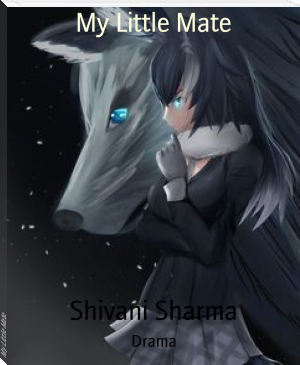THE OLD SANTA FE TRAIL - COLONEL HENRY INMAN (surface ebook reader .TXT) 📗

- Author: COLONEL HENRY INMAN
Book online «THE OLD SANTA FE TRAIL - COLONEL HENRY INMAN (surface ebook reader .TXT) 📗». Author COLONEL HENRY INMAN
Joined the Majority.
The Scouting-Party Had Proceeded about Four Or Five Miles, When One
Of The Corporals Asked permission For Himself And A Recruit To Go
Over To The Upper Walnut To Find Out Whether They Could Discover
Any Signs Of Indians.
While They Were Carelessly Riding along The Big Curve Which The
Northern Branch Of The Walnut Makes At That Point, There Suddenly
Sprang From Their Ambush In the Timber On The Margin Of The Stream
About Three Hundred indians, Whooping and Yelling. The Two Troopers
Of Course, Immediately Whirled their Horses And Started down The
Creek Toward The Camp, Hotly Pursued by The Howling Savages.
The Corporal Was An Excellent Rider; A Well-Trained and Disciplined
Soldier, Having Seen Much Service On The Plains. He Led in the Flight,
Closely Followed by The Unfortunate Recruit, Who Had Been Enlisted
But A Short Time. Not More Than An Eighth Of A Mile Had Been Covered,
When The Corporal Heard His Companion Exclaim,--
"Don'T Leave Me! Don'T Leave Me!"
Looking Back, The Corporal Saw That The Poor Recruit Was Losing Ground
Rapidly; His Horse Was Rearing and Plunging, Making Very Little
Headway, While His Rider Was Jerking and Pulling On The Bit, A Curb
Of The Severest Kind. Perceiving The Strait His Comrade Was In,
The Corporal Reined up For A Moment And Called out,--
"Let Him Go! Let Him Go! Don'T Jerk On The Bit So!"
The Indians Were Gaining Ground Rapidly, And In another Moment The
Corporal Heard The Recruit Again Cry Out,--
"Oh! Don'T--"
Realizing That It Would Be Fatal To Delay, And That He Could Be Of
No Assistance To His Companion, Already Killed and Scalped, He Leaned
Forward On His Horse, And Sinking His Spurs Deep In the Animal'S
Flanks Fairly Flew Down The Valley, With The Three Hundred savages
Close In his Wake.
The Officers At The Camp Were Sitting In their Tents When The Sentinel
On Post No. 1 Fired his Piece, Upon Which All Rushed out To Learn
The Cause Of The Alarm; For There Was No Random Shooting In those
Days Allowed around Camp Or In garrison. Looking Up The Valley Of
The Walnut, They Could See The Lucky Corporal, With His Long Hair
Streaming In the Wind, And His Heels Rapping His Horse'S Sides, As He
Dashed over The Brown Sod Of The Winter Prairie.
The Corporal Now Slackened his Pace, Rode Up To The Commanding
Officer'S Tent, Reported the Affair, And Then Was Allowed to Go To
His Own Quarters For The Rest He So Much Needed.
Captain Conkey Immediately Ordered a Mounted squad, Accompanied by An
Ambulance, To Go Up The Creek To Recover The Body Of The Unfortunate
Recruit. The Party Were Absent A Little Over An Hour, And Brought
Back With Them The Remains Of The Dead Soldier. He Had Been Shot
With An Arrow, The Point Of Which Was Still Sticking Out Through His
Breast-Bone. His Scalp Had Been Torn Completely Off, And The Lapels
Of His Coat And The Legs Of His Trousers Carried away By The Savages.
He Was Buried the Next Morning With Military Honours, In the Little
Graveyard On The Bank Of The Walnut, Where His Body Still Rests In
The Dooryard Of The Ranch.
Chapter XXIII (Hancock'S Expedition)In The Spring Of 1867, General Hancock, Who Then Commanded the Military
Division Of The Missouri, With Headquarters At Fort Leavenworth,
Kansas, Organized an Expedition Against The Indians Of The Great
Plains, Which He Led in person. With Him Was General Custer, Second
Ranking Officer, From Whom I Quote The Story Of The March And Some
Of The Incidents Of The Raid.
General Hancock, With The Artillery And Six Companies Of Infantry,
Arrived at Fort Riley, Kansas, The Last Week In march, Where He Was
Joined by Four Companies Of The Seventh Cavalry, Commanded by The
Intrepid Custer.
From Fort Riley The Expedition Marched to Fort Harker, Seventy-Two
Miles Farther West, On The Smoky Hill, Where The Force Was Increased
By The Addition Of Two More Troops Of Cavalry. Remaining There Only
Long Enough To Replenish Their Commissary Supplies, The March Was
Directed to Fort Larned on The Old Santa Fe Trail. On The 7Th Of
April The Command Reached the Latter Post, Accompanied by The Agent
Of The Comanches And Kiowas; At The Fort The Agent Of The Cheyennes,
Arapahoes, And Apaches Was Waiting For The Arrival Of The General.
The Agent Of The Three Last-Mentioned tribes Had Already Sent Runners
To The Head Chiefs, Inviting Them To A Grand Council Which Was To
Assemble Near The Fort On The 10Th Of The Month, And He Requested
General Hancock To Remain At The Fort With His Command Until That Date.
On The 9Th Of April A Terrible Snow-Storm Came On While The Troops
Were Encamped waiting For The Head Men Of The Various Tribes To Arrive.
Custer Says:
It Was Our Good Fortune To Be In camp Rather Than On The
March; Had It Been Otherwise, We Could Not Well Have Escaped
Without Loss Of Life. The Cavalry Horses Suffered severely,
And Were Only Preserved by Doubling Their Rations Of Oats,
While To Prevent Their Being Frozen During The Intensely
Cold Night Which Followed, The Guards Were Instructed to
Pass Along The Picket Lines With A Whip, And Keep The
Horses Moving Constantly. The Snow Was Eight Inches Deep.
The Council, Which Was To Take Place The Next Day, Had To Be
Postponed until The Return Of Good Weather. Now Began The
Display Of A Kind Of Diplomacy For Which The Indian Is
Peculiar. The Cheyennes And A Band Of Sioux Were Encamped
On Pawnee Fork, About Thirty Miles Above Fort Larned.
They Neither Desired to Move Nearer To Us Or Have Us
Approach Nearer To Them. On The Morning Of The 11Th,
They Sent Us Word That They Had Started to Visit Us, But,
Discovering a Large Herd Of Buffalo Near Their Camp,
They Had Stopped to Procure A Supply Of Meat. This Message
Was Not Received with Much Confidence, Nor Was A Buffalo
Hunt Deemed of Sufficient Importance To Justify The Indians
In breaking Their Engagement. General Hancock Decided,
However, To Delay Another Day, When, If The Indians Still
Failed to Come In, He Would Move His Command To The Vicinity
Of Their Village And Hold The Conference There.
Orders Were Issued on The Evening Of The 12Th For The March
To Be Resumed on The Following Day. Late In the Evening
Two Chiefs Of The "Dog-Soldiers," A Band Composed of The
Most Warlike And Troublesome Indians On The Plains,
Chiefly Made Up Of Cheyennes, Visited our Camp. They Were
Accompanied by A Dozen Warriors, And Expressed a Desire To
Hold A Conference With General Hancock, To Which He Assented.
A Large Council-Fire Was Built In front Of The General'S
Tent, And All The Officers Of His Command Assembled there.
A Tent Had Been Erected for The Accommodation Of The Chiefs
A Short Distance From The General'S. Before They Could
Feel Equal To The Occasion, And In order To Obtain Time To
Collect Their Thoughts, They Desired that Supper Might Be
Prepared for Them, Which Was Done. When Finally Ready,
They Advanced from Their Tent To The Council-Fire In single
File, Accompanied by Their Agent And An Interpreter.
Arrived at The Fire, Another Brief Delay Ensued. No Matter
How Pressing Or Momentous The Occasion, An Indian Invariably
Declines To Engage In a Council Until He Has Filled his Pipe
And Gone Through With The Important Ceremony Of A Smoke.
This Attended to, The Chiefs Announced that They Were Ready
"To Talk." They Were Then Introduced to The Principal
Officers Of The Group, And Seemed much Struck With The
Flashy Uniforms Of The Few Artillery Officers, Who Were
Present In all The Glory Of Red horsehair Plumes,
Aiguillettes, Etc. The Chiefs Seemed puzzled to Determine
Whether These Insignia Designated chieftains Or Medicine Men.
General Hancock Began The Conference By A Speech, In which
He Explained to The Indians His Purpose In coming To See
Them, And What He Expected of Them In the Future.
He Particularly Informed them That He Was Not There To Make
War, But To Promote Peace. Then, Expressing His Regrets
That More Of The Chiefs Had Not Visited him, He Announced
His Intention Of Proceeding On The Morrow With His Command
To The Vicinity Of Their Village, And There Holding a
Council With All The Chiefs. Tall Bull, A Fine, Warlike-Looking
Chieftain, Replied to General Hancock, But His Speech
Contained nothing Important, Being Made Up Of Allusions To
The Growing Scarcity Of The Buffalo, His Love For The White
Man, And The Usual Hint That A Donation In the Way Of
Refreshments Would Be Highly Acceptable; He Added that He
Would Have Nothing New To Say At The Village.
Rightly Concluding That The Indians Did Not Intend To Come
To Our Camp, As They Had At First Agreed to, It Was Decided
To Move Nearer Their Village. On The Morning Following The
Conference Our Entire Force, Therefore, Marched from
Fort Larned up Pawnee Fork In the Direction Of The Main
Village, Encamping The First Night About Twenty-One Miles
From Larned. Several Parties Of Indians Were Seen In our
Advance During The Day, Evidently Watching Our Movements,
While A Heavy Smoke, Seen To Rise In the Direction Of The
Indian Village, Indicated that Something More Than Usual
Was Going On. The Smoke, We Afterward Learned, Arose From
Burning Grass. The Indians, Thinking To Prevent Us From
Encamping In their Vicinity, Had Set Fire To And Burned all
The Grass For Miles In the Direction From Which They
Expected us. Before We Arrived at Our Camping-Ground,
We Were Met By Several Chiefs And Warriors Belonging To The
Cheyennes And Sioux. Among The Chiefs Were Pawnee Killer,
Of The Sioux, And White Horse, Of The Cheyennes. It Was
Arranged that These Chiefs Should Accept Our Hospitality
And Remain With Us During The Night, And In the Morning all
The Chiefs Of The Two Tribes Then In the Village Were To
Come To General Hancock'S Head-Quarters And Hold A Council.
On The Morning Of The 14Th, Pawnee Killer Left Our Camp At
An Early Hour, As He Said For The Purpose Of Going To The
Village To Bring In the Other Chiefs To The Council.
Nine O'Clock Had Been Agreed upon As The Time At Which The
Council Should Assemble. The Hour Came, But The Chiefs
Did Not. Now An Indian Council Is Not Only Often An
Important, But Always An Interesting, Occasion. At This
Juncture, Bull Bear, An Influential Chief Among The
Cheyennes, Came In and Reported that The Chiefs Were On
Their Way To Our Camp, But Would Not Be Able To Reach It
For Some Time. This Was A Mere Artifice To Secure Delay.
General Hancock Informed bull Bear That, As The Chiefs
Could Not Arrive For Some Time, He Would Move His Forces
Up The Stream Nearer The Village, And The Council Could Be
Held At Our Camp That Night. To This Proposition Bull Bear
Gave His Consent.
At 11 A.M. We Resumed the March, And Had Proceeded but A Few
Miles When We Witnessed one Of The Finest And Most Imposing
Military Displays, According To The Indian Art Of War,
Which It Has Been My Lot To Behold. It Was Nothing More
Nor Less Than An Indian Line Of Battle Drawn Directly
Across Our Line Of March, As If To Say, "Thus Far And No
Further." Most Of The Indians Were Mounted; All Were
Bedecked in their Brightest Colours, Their Heads Crowned
With The Brilliant War-Bonnet, Their Lances Bearing





Comments (0)